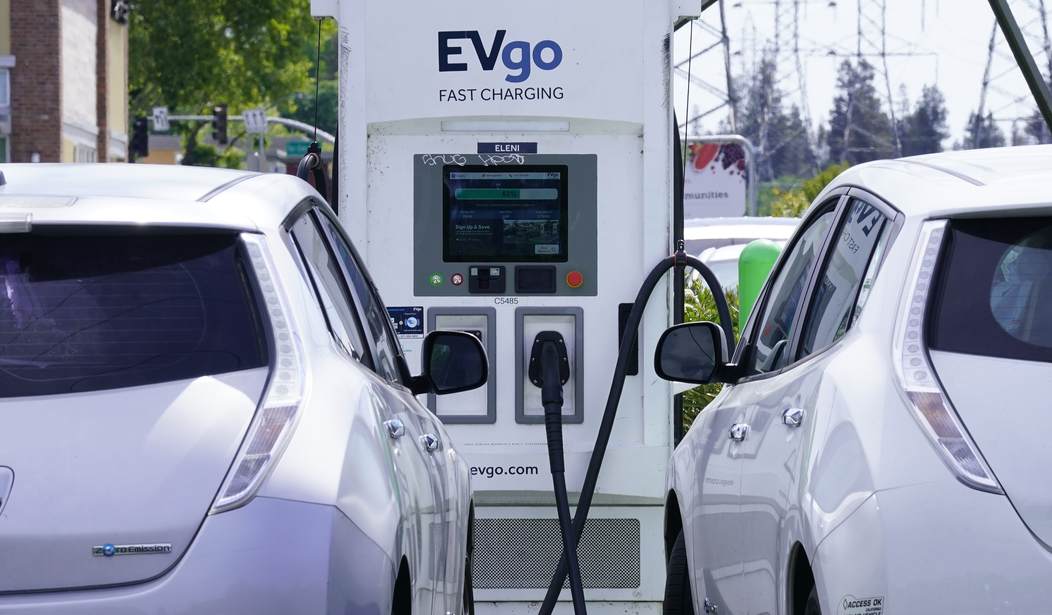By now, most of us have seen the reluctant reporting from media outlets checking in with vehicle dealerships around the United States. Car lots are filled with electric vehicles, many with their original sales prices reduced. Most people simply aren’t interested in purchasing an EV despite any mandates being issued by state governments or the White House. There are various reasons for this, including the high cost of these vehicles (despite generous, taxpayer-funded rebates) and the uncertainty of there being sufficient charging stations to keep them running. Now Ford has seemingly woken up to the reality of the situation. In 2024, they will be drastically cutting their production of their “best-selling” EV, the F-150 Lightning. This year, they were producing 3,200 trucks per week. Next year the figure will fall to 1,600. (AEIR)
On Monday, Ford announced it was slashing in half its production goal for its most popular electrical vehicle, the F-150 Lightning pickup truck.
Bloomberg News reports that the company’s flagship plant in Dearborn, Michigan now intends to produce 1,600 vehicles per week in 2024, down from 3,200 in 2023.
The move comes just months after Ford announced it was slashing prices on the Lightning by $10,000. And though the company cited lower “battery raw material costs and continued work on scaling production and cost” for its price cut, it’s becoming painfully obvious that low demand for EVs was the primary catalyst.
AEIR describes this development as an example of “what happens when companies heed planners instead of consumers.” That sounds like a very accurate assessment. They note that Ford appears to be trying to cover their tracks by crediting lower raw material costs for batteries and more efficient production line practices. But the harsh reality is that the demand for these vehicles is nowhere near the sunny projections put forth by the government.
This entire concept is nearly unique in the history of American capitalism. We have the phrase “whatever the market will bear” for a reason. Traditionally, manufacturers competed with each other to create and produce products that consumers would desire the most. The winners of that competition profited while the losers fell by the wayside. They also strove to make their products as affordable as possible, further keeping a leg up on the competition.
The idea of the government mandating the production of one type of product while effectively banning a competing option is unheard of. This is particularly true when the mandated product is more expensive and less desirable than the original version. Such a move delivers a disservice to both the manufacturers and the public.
It is not the government’s place in a capitalist society to dictate what consumers should or should not desire. Even if it’s being done to “save the planet,” people should still have the freedom to make their own choices. There are exceptions, of course, such as products deemed to be unfit for safe consumption, such as illegal drugs. But claiming that the “climate crisis” justifies any sort of mandate that catches the fancy of the government was never going to be an acceptable sales pitch.
Also, consumers seem to be wise enough to realize that the entire theory behind the supposed benefits of electric vehicles is sketchy at best. You still need energy to make a vehicle run. Whether that energy comes from burning gasoline in an internal combustion engine or from a battery, the power has to come from someplace. And “green energy” is still not even remotely close to being able to provide all of the power required, so most of the electricity used to charge those vehicle batteries is coming from fossil fuels or nuclear power.
The technology to design and manufacture electric vehicles has arrived and they will remain on the table as an option. That’s how it should be. If someone prefers an EV, they should have the opportunity to buy one. But if that’s not a good fit for most consumers, we do not need the heavy hand of the government shoving them into our garages.








Join the conversation as a VIP Member